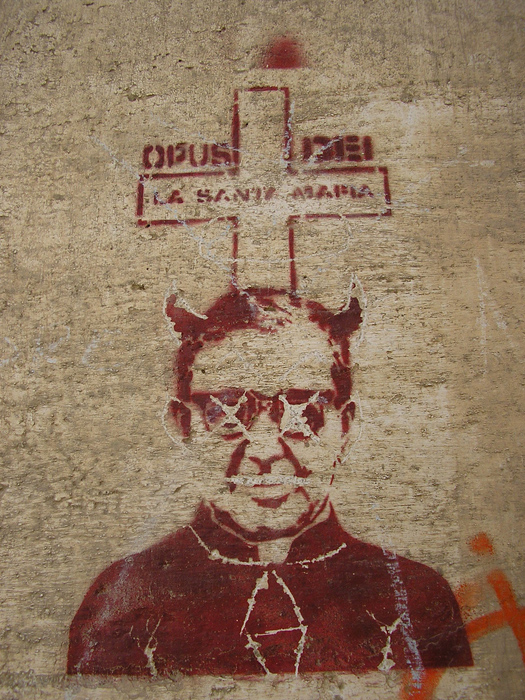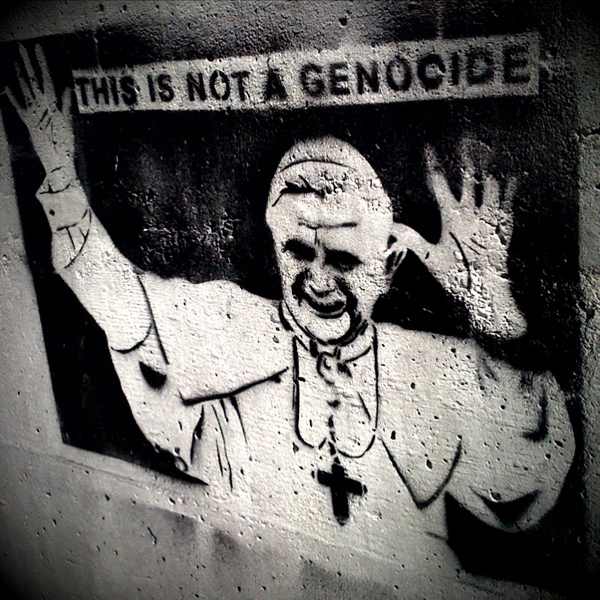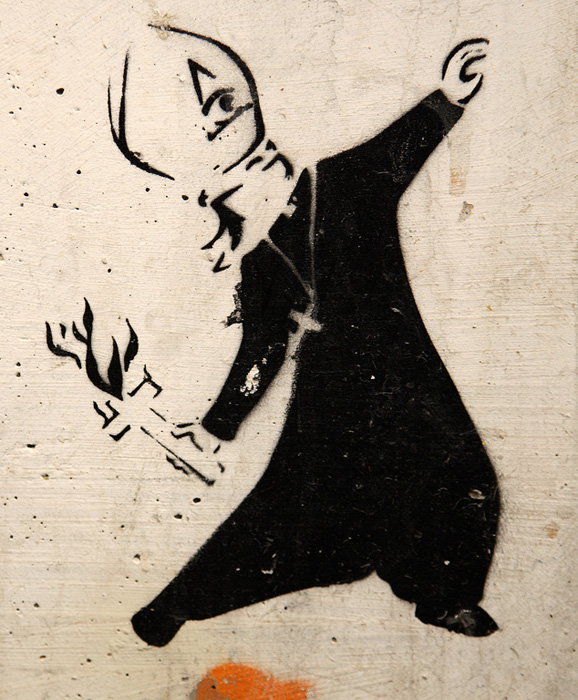|
|||||||||||||
|
a God of Wealth
The Relationship By Punkerslut
Blindfolds for the Cattle
The church and the temple have always regarded themselves as holding a monopoly on absolute truth. They have not ventured forward into practical questions of relative truth, those being answered today by science, investigation, and inquiry. The knowledge that the pastor, rabbi, and imam gave to their audiences was the knowledge of philosophical truth -- the origin of the universe, the purpose of the individual, and the role of the religious authorities as negotiators between humanity and god. Such a powerful position was founded on superstition. The power of the priest existed solely because of the imagination of his listeners. The control of the masses, however, was not directed toward their enlightenment or upliftment. The synagogue, the mosque, and the convent have built up their confidence among the people, but this confidence was abused and exploited. Posing as the bargainers pleading for mercy on the frail nature of humanity to god, they actually sold their flocks to the butchery, for slaughter, for labor, and for the constant reproduction of this system. The cunning cruelty of the priests, naturally, could hardly have attracted those who genuinely felt sympathy on behalf of the workers. If an individual felt that the peasants were exploited in the middle ages, why would they have joined the clergy? Why would they become part of an organization kidnaps peasants, tortures them to confess, and then burns them alive for heresy? There would be no reason; and so the church has always repelled the progressive voice, and with such an obedient mass at their heels, exploiters and oppressors have always asked to borrow this confidence. The capitalist says, "Tell them that god wants us to overwork them, and I'll donate to the church funds," -- this is an accurate, one-sentence summary of the relationship between God and Capitalism. The connection drawn out Joe Hill perfectly matches the relationship generally viewable between the organized forces of capitalism and superstition. By telling the people that they will have heaven once they die, an unending experience of bliss and happiness, they don't think so much about their current miseries. Why lead an uprising and risk being sinful, where you could be condemned to eternal hellfire? It is better to sit with your chains, to pray for salvation, and to finally be rescued from the grave when you're already dead. The Capitalist and the Pastor, then, work side by side: the first pays the smallest wages possible, and the other makes it seem acceptable by adding psychic wages, such as eternal happiness in a far away land. To quote George Orwell in 1940...
To keep the mind of the person focused on god and being saved, then, means keeping them away from thoughts of society and being liberated. Take Christ and his very real chains -- instead of taking reality and a very possible emancipation. Keep the mind focused on the stories of the Bible, the characters of Moses and Noah, those obedient and subservient to their masters, who have always received well for following. Even in the education of the youth, religious teachers do everything they can to keep a darkness reigning in the mind. Religious instruction keeps the cattle more subservient and obedient. To quote Sylvia Pankhurst...
Be content and be happy. The chains you suffer today are only for your lifetime. In the afterlife, you shall have eternal pleasure and peace of mind, so think of that. Don't think that you lived like a slave, your parents lived like a slave, and anyone you bring into this world will live like a slave -- think about how they'll die like kings, being resurrected in the kingdom of heaven. Forget that you ever thought you were worthy of the dignity of standing up; your flesh is condemned to the lowliness of servitude, but your soul may be heavenbound. And from its inherent and essential premises, religion is based on forgetting that so many suffer today, in favor of imagining a world tomorrow where suffering cannot theoretically exist.
The Church Justifies Exploitation of the Poor
The view of religion, with a focus on the soul of man and not his mind, easily moves from passive support of exploitation to active propping up of tyranny. If it teaches the masses to be content with their miserable earthly existence, it will naturally teach them to submit to the rich -- it will teach them not to be upset that they go without because it is the will of god, even though the teachers of god have plenty. While in the past it was kings and nobility to split up their exploitation of the people, with the blessing of the priesthood, today the priesthood blesses the exploitation done by government and capitalism. The transition has been far more slight than popular historians are allowed to let on. To quote Robert Green Ingersoll in 1876...
Ingersoll was only a Liberal strongly influenced by the tendencies of Socialism and organized labor. Anarchists and Socialists who made up the Industrial Workers of the World (IWW) offer a similar examination of the role of religion in oppressing the toiling masses...
The IWW was ushering in a new style of union organizing: industrial unionism. It was their plan to organize the entire working class into a single union to be used against the whole, capitalist system. In contrast this organization, there was the American Federation of Labor (AFL), which had been set up in the opposite style of union organizing: craft unionism. That is, workers divided into many tiny, insignificant unions, these unions only representing the skilled workers. It was considered beneficial by the AFL that the great vast majority of the unskilled, working class should stay out of union organizing altogether. Naturally, the leaders of the AFL formed an exclusive organization with the business leaders who were they were supposed to be collective bargaining with on behalf of their union members. It was as much a social club as it was a religious and economic collaboration. This is why Eugene V. Debs, who organized unions at around the same time, was imprisoned and kidnapped by a private corporation that was endowed by the US president with the right to law enforcement. [*6] Debs fought for independent unions, where the workers fought and resisted the Capitalist class. Samuel Gomperz, on the other hand, founded the AFL within the blessings of church and capitalism. The Civic Federation that operated over the AFL was, naturally, a completely religious organization...
One may brush this off as nothing. It was simply a group of ignorant workers expressing their devout faith. They may have simply wanted an outlet for those ideas they were given before they could read. But when we look toward the associations that the AFL cooperated with, the meaning and purpose of religion within economics becomes far more clear. During the twenties and thirties, there was open warfare between the AFL and CIO, unfortunately having been united together today. The AFL's business partners ramped up their rhetoric of religion to help them in their battle against working-class, inclusive unionism. To quote a standard, university textbook on labor unionism...
In Spain, the slogan is well known, "Money is a good Catholic," based on the reverence for property instead of humanity by the church. In that country, the cooperation between organized Catholicism and exploitation Capitalism is quite obvious. However, it is just as present in the United States, though it is somewhat disarmed by the greater diversity. To quote Margaret Sanger from 1936...
The partnership between exploiters and church officials is clear if we examine Europe, as well. To quote the Italian Socialist, Enrico Ferri in 1902, "...Clericalism, with its spirit of resignation, is 'the fatty degeneration of religion' used as the ally of capitalist supremacy." [*10] Ferri also mentions, "...it is easy to show, when a strike occurs to peasants and workers, the social meaning of Clericalism, when it is seen that the priests are always on the side of the capitalists." [*11] The monks, throughout the middle ages, did everything they could to justify exploitation and the domination of the few over the many. This is often forgotten in history lessons in schools today...
Nor does one have to go back decades or centuries just to find the collaboration between the clergy and the capitalists. In 2006, a teacher's strike in Oaxaca, Mexico blew up into a revolution that had overthrown the rule of government and capitalism for six months. Naturally, though, the Church was on the side of those who fired machineguns into the crowds of men, women, and children. One progressive member of the Catholic Church noted when he was helping those who were attacked, "...at the same time, there was another perspective in the Church. The Archbishop, and a small group of priests, began to align themselves with the powerful by supporting the federal government." [*13]
The Clergy Support Violence Against Those Seeking Social Change
Honest, intellectual thought naturally abhors censorship. There can be no thinking where there is no expression of diverse, even opposing opinions. In this respect, the church has absolutely every right to state that it worships the landowner and wants tho subjugation of the landless. It has a right to hate the worker for trying to emancipate themselves -- and, likewise, the worker has a right to hate the church for its ignorance and cruelty. But, it is something entirely different when the church arms itself and then uses violence to slaughter its opponents when it cannot win by arguments. Yet, this is virtually the case everywhere the church has started to lose ground: the resort to cruel violence against the workers. History books mention it a few hundred are killed during St. Barthomolew's Day Massacre, because they were killing Protestants, who also supported Capitalism historically. They don't mention it when tens of thousands are killed, such as during the Paris Commune, because the Catholic armies were killing organized Socialists, Anarchists, and Communists. In Ludlow, Colorado, the National Guard shot and killed 19 workers for striking, following directly the orders of Rockefeller -- and not anything even mildly resembling the general will of the people. This is Capitalism: as long as almost everyone works for almost nothing, you have the right to life. Otherwise, you don't. The profits from this business were used to build up the churches throughout America, and so the pastors from one end of the nation to the other condoned the massacre...
During World War 2, George Orwell was very conflicted at whether to support the Allies in crushing the Nazis, or just to support the crushing of the Nazis. After all, he pointed out, prisoner for prisoner, the Allies have significantly many more people exploited and oppressed than Nazi Germany. [*15] This fact, too, doesn't appear much in the history books, and yet no professional journalist could deny it. Scenes like those produced at Ludlow must have been a strong, determining factor, as Britain similarly affords many examples of violent oppression of the workers. During the 1800's, the missionaries of Europe were fighting for the right to spread their religion, as well as their commerce, in Japan. The Japanese had decided to bar all foreigners. This was a carefully calculated strategy based on the experience of Japan's neighbors, India and China, who had been essentially become colonies of slaves to European masters. Yet, the arguments used by the Christian missionaries in demanding a right to Japan are almost funny...
The Japanese, when they prohibit foreign Capitalists from exploiting their people, are being "exclusive" and they are stopping others "from a participation in its riches and virtues." Isn't this the exact reason why Socialists and Unionists have been fighting to overthrow Capitalism for the past century or so? Of course. However, the church today no longer talks about how property ought to be "for the benefit of all." That rhetoric was useful back when they wanted to convince Britain to invade Japan -- not today when it might be associated with revolutionary Socialism. The poor ought to be excluded, but never the rich. This statement was co-authored by clergy and merchants in 1852 -- they didn't yet worry about Socialism or unionism, which were underdeveloped, because Capitalists more thoroughly controlled the government and workers didn't even have the right to vote. They could talk about things like "the benefit of all" and equal right to wealth, without arousing any suspicion. What they had really meant was the benefit of a few capitalists, merchants, and missionaries who were going to exploit and dominate the Japanese people. "Oh, the great miserable wrong of making our Capitalists go with only 90% of the total profit that could have been accumulated," the priest cries and moans, as the dead bodies of striking workers at his feet don't even catch mild attention. Directly at the barrel of a gun, or indirectly with the threat of imprisonment, the church has sanctioned every type of violence and force imaginable. In Australia in 1909, the Church had found rather interesting devices for suppressing the workers' disagreement with Capitalism...
The Catholic Church gave its blessings to the weapons of British, French, Spanish, and even the Eastern Orthodox Russians when it came to destroying the Japanese people. It should hardly be difficult to believe, then, that the Church also gave its blessings to tyrants who had oppressed the working class in its own nation. To quote an anonymous pamphlet distributed by anti-Fascist forces in the peninsula, "Before 1870, the Church had suffered enormously in Italy from the fact that she identified herself with the Bourbon and Austrian tyrants who were keeping my country enslaved." [*18] One does not need to restrict their vision to Catholicism in order to see the relationship between church masters and property masters. Martin Luther, for example, was known as a fierce opponent of the bureaucracy, waste, and extravagance of the Catholic Church. His battle was an unconventional struggle against standards in religious power. But when the peasants tried to wage a battle against the conventional standards of serfdom, exploitation, and slavery, he claimed they were heretics. Simply by fighting against those who possess others as slaves, one is doomed to hell, according to the father of Protestantism. As he wrote in 1525, in a brief pamphlet titled "Against the Robbing and Murdering Hordes of Peasants"...
The spirit of equality, freedom, and communism lurks its head into the public, and the religious thinker charges at it with their feelings of intolerance and inhumanity. It was right for Martin Luther to seize power from other Catholics, because he was gaining the power; but it was wrong for peasants to seize power from their exploiting vassal lords, because it would mean that he, Martin Luther, would be losing power. Though Martin Luther started the trend of Protestantism, others who strayed from the Catholic path similarly sided with Capitalist domination. John Calvin, for example, proved that Protestants can be even more egotistic, property-based, and intolerant than Catholics. "Discipline is the nerve of religion," he remarked, [*20] demanding obedience of the workers not just to their masters, but to the place they occupy in society. Everything even remotely useful to relieving the stress of the laborers, from dancing to drinking to singing to games, was prohibited by John Calvin -- he placed no restrictions on letting the poor starve to death, or on the gluttonous consumption of the wealthy nobles. [*21] Just as one can find this unbridled support of Capitalism in Protestantism and Catholicism, so one can find it in nations outside of Europe's scope. "...the [Eastern] Orthodox Church in Russia was closely linked to the imperial regime, and it naturally sided with the Whites in the Civil War," writes Russian historian Nicholas V. Riasanovsky. [*22] It should be noted not that the Eastern Orthodox Church did not exclusively fight against Bolshevism, but it exclusively fought for the Capitalist-dominated, church-affiliated monarchy. This means that the church officials came out against the Communists, the Democratic Socialists, the Anarchists, and even the Liberals. Any type of state where the workers have the right to organize is unacceptable -- this was the point of view of the Eastern Orthodox Church. To fight its ancient enemy the Eastern Orthodox Church, and to protect its land holdings established for this purpose, the Catholic Church decidedly sided with the Bolsheviks; but this was in its official activity within Russia, while the propaganda outside of Russia condemned the Bolsheviks. [*23] Unlike the Eastern Orthodox Church, the Catholic Church saw quite clearly that Lenin never had any interest in really creating revolutionary Communism. After all, during World War 1, the Catholic Church had no problem when the German government transported Vladimir Lenin to Russia, so he could create revolution. [*24] This act, too, was most unusual, for Germany to deliver a Russian citizen to his homeland -- as the two nations were currently at each other's throats in World War 1. The support for the Soviet Union from the Catholic Church shouldn't be entirely alarming. The church, likewise, loaned its support to nations that created forced labor camps in France, Germany, Italy, Spain, and Eastern Europe. In Spain, there has been a long history of opposition between any group of workers organized for their rights and any group of clergy trying to preserve their privileges. To quote Spanish historian Chris Ealham concerning the relationship of the Anarchist Revolution of 1936 and opposition to the church...
In 1936, most of the army officials of Spain had gathered around the general Francisco Franco in his coup d'etat against the elected government. The Catholic Church loaned its support, its wealth, its blessings, and its arms to the new dictatorship. It didn't matter that it was a Fascist government that had already built concentration camps; it was more important for Catholics to crush the threat of revolutionary Anarchists and Socialists in Spain. As they wrote in one propaganda piece defending the coup d'etat by the Fascists...
The belief that the majority of Spain supported Franco eventually subsided, or at least, was covered up and ignored. When Francisco Franco won the war in 1939, the Church hushed anyone who made suggestions about reinstituting elections. The Fascist dictatorship had been permanently established, with the sanction of the Catholic Church. The history of the intermingling of Catholicism and Capitalism in Spain goes back for centuries, though. To quote Gerald Brenan...
Support for Fascism and the police state in Spain naturally came with its support in Italy. In the earlier quoted, anti-Fascist pamphlet from Italy, you can read, "[Pope] Pius XI is closely allied with conservative Lombard circles, noted for their narrowly reactionary and definitely antiproletarian spirit." [*28] And elsewhere, "...the Vatican did its utmost to induce Catholics to vote for Fascist candidates. The most influential of the bishops went actively to work and broadcast the message..." [*29] Finally, there are the words that the Pope himself said about Mussolini, the dictator who crushed the Italian Socialist movement and enslaved his own people...
Few people are aware that the Bank of Rome is a Catholic Institution and that it acts as a financial center for global exploitation of the working poor. Fewer people are aware that it has often gone into "bankruptcy," which was simply a ploy for using the state to overtax the people on behalf of the church...
Just as in the case of the church supporting capitalism, there are also many current situations where the church supporting capitalism through violence. In Nicaragua, the United States and the Catholic Church had supported and funded terrorism against the common people, so nobly funded through selling cocaine in the United States. The Church, of course, came out in support of the terrorist Contras in 1984. [*32] The primary reason for support was that the Contras were opposed to the Sandinista National Liberation Front, a Socialist and Left-wing organization. In fact, Archbishop Obando y Bravo, who came out to support the burgeoning Fascist dictatorship, had falsely accused the representative government of terrorism -- the exact same trend seen in the development of the Spanish Civil War. After these statements in favor of concentration camps and political police, the Pope promoted Archbishop Obando y Bravo to Cardinal. [*33] Nicaragua, like much of central America, is largely Catholic. The voice of its people, demanding freedom from violent dictatorships, were ignored by the "Pro-Life" Pope. The situation was not different in Mexico in 2006...
Violence, when it is enacted on behalf of property and against human life, is considered the greatest honor by the Pope. It is an act treasured by the Protestant Churches, admired by the Eastern Orthodox Church, and revered in the sermons of their subservient preachers. Since it was violence done to destroy Socialism, it must be useful. It must be good according to the will of god. The organized forces of Christianity have been some of the greatest supporters of violence for crushing any type of workers' power, whether expressed by union organizing or workers cooperatives or radical anti-capitalism.
To Withdraw Charity and Make it Exclusive
With the Great Depression, the Catholic and Protestant churches did something almost unthinkable. Official opinion at the top of these hierarchies sent down an official edict: all charity programs are to be cut off, those demanding soup at the kitchens to be turned away, and those begging for some place to sleep thrown out. It's not a common theme found in American history books, because it's rather disgusting all around: the wealth of the church existed solely because of the voluntary contributions of its members. It should also be noted, that at around this time in 1929, the Catholic Church was receiving more than 44 million Pesetas annually from the Spanish government, solely as a gift for being a good Spanish citizen -- even though she lived in Italy. [*35] In Canada, one found extreme wealth, too, "Canadien [French-Canadian] capitalism has hitherto been largely religious; the accumulations of this society meet the eye everywhere in the possessions of the Church, the gratefully acknowledge custodian of the value beyond all other values." [*36] Despite all this, the Church still disbanded virtually all of its public charity throughout the Americas during the Great Depression...
The resentment against church authorities was powerful throughout the United States, too. Quoting a factory worker from New England during the same time period, in a study by the noted sociologist W. Lloyd Warner, "St. Anthony's Guild folded up a year ago. The Father said they couldn't support the people they'd helped for years, old people. So he came to me and told me about it. Both the Protestant and Catholic churches have fallen down on charitable contributions. They ain't doing nothing." [*38] Even today, there are strong elements within the church that are criticizing it for being so focused on the self-interest of the few. To quote Padre Arias during his involvement in the 2006, Oaxaca uprising of Mexico...
Throughout the realms of Christian thought and activity, one can find a devout support for the system of Capitalism. There is not just a defense for the system of "free" trade. There is a defense for using violence, coercion, prisons, forced work camps, terrorism, civilian bombing, and dictatorships in order to achieve this "free" trade. The Christian god is a god of wealth. And there is no blasphemy quite so extreme as Socialism.
Punkerslut, Resources *1. "Notes on the Way," by George Orwell, 1940.
|






